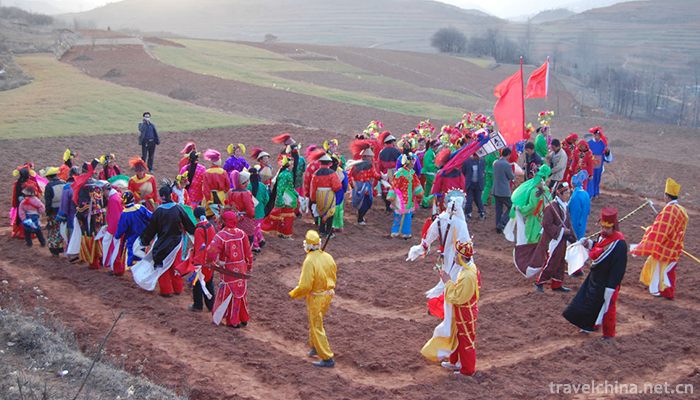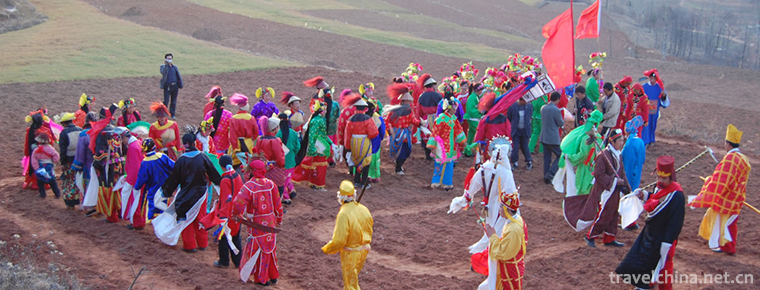Wudu Alpine Opera
Wudu Alpine Opera
Wudu Alpine Opera, also known as Alpine Opera, is one of the two unique local operas in Gansu Province. In 2008, Wudu Alpine Opera was selected as the second batch of national intangible cultural heritage list. The stage performances of "Alpine Opera" are generally divided into "stepping on the stage", "opening the curtain", "playing a small song" and "performing a story". Among them, "performing a story" is the formal content of "Alpine Opera", while other performances such as "Grand Villa", "Shang Temple" and "Walking Print" have obvious characteristics of praying for blessings, entertaining gods and entertaining themselves.
On June 7, 2008, the Wudu Alpine Opera declared by Longnan City of Gansu Province was listed in the second batch of national intangible cultural heritage list with the approval of the State Council. Heritage serial number: 735 IV-134.
historical origin
Alpine Opera originated in Yulong Town, Wudu District, Longnan City, Gansu Province. It mainly spreads in Yulong, Longxing, Jinchang, Longba, Hanwang, Ma Jie, Anhua, Foya, Ganquan, Jiaogong, Chengguan and other towns in Wudu District. It also spreads in Xihe, Lixian, Kangxian, Wenxian and Chengxian counties. Ichthyosaurus and other places belong to alpine and hilly areas, with deep mountains and gullies and inconvenient transportation. Potatoes, corn and wheat are the main agricultural products. Folk activities such as temple fairs, sacrifices and social fires have been prevalent here since ancient times. Alpine Opera is a kind of opera which is bred, evolved and developed from the folk sacrifices and traditional social fires here.
Before 1959, people in Yulong, Longxing and other places called it "storytelling", "going through the stage", "social fire drama" and so on.
In October 1959, it was named "Alpine Opera".
In 1965, it was published in Cihai Art Catalogue, Chinese Traditional Opera Culture and Dictionary of Chinese Traditional Opera Art. In 2008, it was recognized as a national intangible cultural heritage.
artistic characteristics
Stage setting
The stage performances of "Alpine Opera" are generally divided into "stepping on the stage", "opening the curtain", "playing a small song" and "performing a story". Among them, "performing a story" is the formal content of "Alpine Opera", while other performances such as "Grand Villa", "Shang Temple" and "Walking Print" have obvious characteristics of praying for blessings, entertaining gods and entertaining themselves.
Music for voices in a Chinese Opera
Alpine Opera is a kind of opera with opera brand. Its singing tone can be divided into two categories: Huanyin and Shangyin. Alpine operas such as "Huanyin" singing tones as "Gulu", "Ten Fans", "Jinzhuangyuan", "Zhuangyuan Huifu", "Entering Garden", "Menduer", "Taiping Year" and so on are lively, exquisite and beautiful, while "Shangyin" singing tones such as "Carmine Tears", "Rolling White Belt Crying Tune", "Wangge" are haunting and sad.
The language of Alpine Opera is a genuine Wudu dialect, lively and humorous. The Lyric format is relatively fixed, there are seven-character two-sentence couplets, five-character Four-Sentence quintessence, folk song style, rhyme poetry style and so on. A large number of linings and flexible forms of bangqiang constitute the unique singing style of Alpine Opera. The accompaniment instruments of Alpine opera are divided into martial music and literary music. There are big drums, big gongs and four tiles in martial music. The literary music includes "big tube", "earth pipa" and "erhu".
Performing characteristics
The performance of Alpine Opera has the characteristics of "Ba Dance" dancing, rocking, twisting and swinging steps in the social fire arena, but more actions are the reproduction and processing of life and labor by common people's actors. In recent decades, with the continuous participation of cultural artists, their performance level has been significantly improved. Alpine dramas are rich and colorful in content. Most of them have positive significance in promoting benevolence and morality and educating people.
Representational repertoire
Representatives of traditional plays include: Xianyang Bill Collection, Liu Four Bill, Lao Chang Shao, Baiyu Frost, Kangxi Master Bai, Er Jiniang Ugly, etc. Creating plays include "Open Lock", "Hu son-in-law", "Blocking Car", "Lao Xinhong", "Night Escape", "Special Party Fees" and so on.
Inheritance Significance
Alpine Opera has been circulating in Wudu and other places for hundreds of years, and is deeply loved by the people. It is the embodiment of the values and world outlook of the ancient working people, the witness of history and the spiritual food of the local people. The study of mountain opera culture will add new contents to the study of national folk culture and drama culture. Digging, rescuing and protecting Alpine operas can enrich people's cultural life, improve people's cultural quality, and promote the construction of a harmonious society and spiritual civilization.


-
1.Mianzhu New Year Picture Village Scenic Area in China
New Year Picture Village is located in Xiaode Town, South Gate of Mianzhu City, Sichuan Province. It is located between De'a Highway and Chengqing Highway, 73 kilometers away from Chengdu and within o
Time 2018-12-22 -
2.Bao Xiaosu Temple
Baoxiao Sugong Temple, abbreviated as "Baogong Temple", is located on a mound in the east section of Huancheng South Road, Hefei City, Anhui Province. It is the main ancient building complex
Time 2018-12-26 -
3.Tianzhu Mountain National Forest Park
Tianzhushan National Forest Park, a national 4A-level tourist attraction, is located in Tianzhushan Town, 30 kilometers southeast of Shanyang County Town, Shaanxi Province, south of Huling and north o
Time 2019-02-22 -
4.Wu Songgun Taiwan Wetland Forest Park
Wu Song Gu Taiwan Wetland Forest Park: Wu Song Gu Taiwan Wetland Forest Park with a total area of 53.46 hectares is located in the eastern part of Baoshan District
Time 2019-02-22 -
5.Buddhist music
Buddhist music, the music used by Chinese Buddhist temples and believers in religious ceremonies. Buddhism believes that music has the function of "offering" and "praising Buddha".
Time 2019-04-29 -
6.Manchu Pearl Ball
Pearl ball is a traditional sport of Manchu, originally known as pearl picking, which originated from the ancient pearl picking production activities of Manchu. In the age of Taizu Nuerhachi in the Qi
Time 2019-05-20 -
7.Pumi rubbing
Pumi nationality rubbing "rubbing consultation" is Pumi language, "rubbing" means dancing, "rubbing" means dancing, that is, dancing. When dancing, the leader strikes the
Time 2019-06-09 -
8.Steamed pork with rice flour
Yuan Mei, a Qing Dynasty poet of steamed pork with rice flour, is a Jiangxi dish in Suiyuan food list. It belongs to a variety of cuisines in southern China (such as Sichuan, Chongqing, Hunan, Anhui,
Time 2020-03-22 -
9.Ding Zhens voice is on the rise and the tiktok of Ganzi Sichuan has doubled
In November 11th CCTV news and Oriental tiktok were put on a short video of the tremble. Ding Zhen, the "sweet boy" in the video, triggered a phenomenal network event with a transmission volume of more than 5 billion times. At the same time, Ding Zhen also became the propaganda Ambassador of his hometown Litang County, driving the search volume of "Litang" to soar by 620%.
Time 2020-12-07 -
10.Deyang medical and health
By the end of 2018, Deyang City had 2819 health institutions (including village clinics), including 7 centers for Disease Control and prevention, 7 health supervision institutions, 1 Emergency Center (station), 6 maternal and child health centers,
Time 2020-12-14 -
11.Administrative division of Dazhou
In 1950, Daxian district was set up, which belongs to the northern Sichuan administrative region. Daxian special office is located in Daxian county and governs eight counties, including Daxian County, Xuanhan County, Kaijiang County, Pingchang
Time 2020-12-20 -
12.Dazhou Sports
By the end of 2019, Dazhou city has a total of 9 stadiums and stadiums, sports lottery revenue of 242 million yuan, and 694 new sports fitness projects for farmers.
Time 2020-12-20